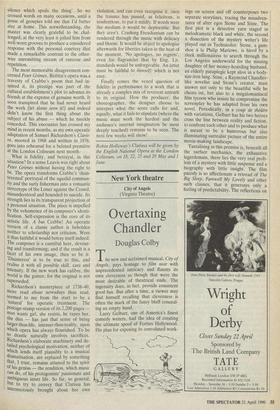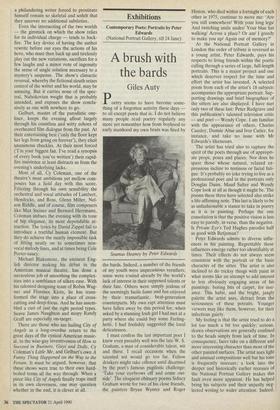New York theatre
City of Angels (Virginia Theatre)
Overtaxing Chandler
Douglas Colby
The new and acclaimed musical, City of Angels, pays homage to film noir with unprecedented intricacy and flaunts its own cleverness as though that were the most desirable of theatrical ends. The ingenuity does, in fact, provide consistent good fun. But after a time, a viewer may find himself recalling that cleverness is often the mark of the fancy bluff conceal- ing an empty hand. Larry Gelbart, one of America's finest comedy writers, had the idea of creating the ultimate spoof of Forties Hollywood. His plan for exposing its convoluted work- ings on screen and off counterposes two separate storylines, tracing the misadven- tures of alter egos Stone and Stine. The first plot is a detective yarn staged in melodramatic black and white, the second a dissection of the mystery writer's life played out in Technicolor. Stone, a gum- shoe a la Philip Marlowe, is hired by a sleek millionairess to search through the Los Angeles underworld for the missing daughter of her money-hoarding husband, an elderly paraplegic kept alive in a body- size iron lung. Stine, a Raymond Chandler- like novelist and Stone's creator, must answer not only to the beautiful wife he cheats on, but also to a megalomaniacal film tycoon who insists he compromise the screenplay he has adapted from his own novel. Periodically, in a coup de theatre with variations, Gelbart has his two heroes cross the line between reality and fiction, to confront each other and to produce what is meant to be a humorous but also illuminating surrealist picture of the entire movie-making landscape.
Tantalising as this premise is, beneath all the surface mechanics, the exhaustive legerdemain, there lies the very real prob- lem of a mystery with little suspense and a biography with little insight. The film parody is so affectionate a retread of The Big Sleep, Farewell My Lovely and other such classics, that it generates only a feeling of predictability. The reflections on a philandering writer forced to prostitute himself remain so skeletal and unfelt that they uncover no additional subtleties.
Even the intersecting of the two worlds — the gimmick on which the show relies for its individual charge — tends to back- fire. The key device of having the author rewrite before our eyes the actions of his hero, who must then back up and tirelessly play out the new variations, sacrifices for a few laughs and a minor note of ingenuity the sense of single solution necessary to a mystery's suspense. The show's climactic reversal, whereby the fictional sleuth seizes control of the writer and his world, may be amusing. But it carries none of the spec- tral, Nabokovian weight that is probably intended, and exposes the show conclu- sively as one with nowhere to go.
Gelbart, master of the parodistic one- liner, keeps the evening afloat largely through his countless and witty echoes of overheated film dialogue from the past. At their entertaining best (`only the floor kept her legs from going on forever'), they elicit unanimous chuckles. At their most forced (I'm your biggest fan. I've read a synopsis of every book you've written') their rapid- fire insistence at least distracts us from the evening's underlying lacks.
Most of all, Cy Coleman, one of the theatre's most ambitious yet mellow com- posers has a field day with this score. Filtering through his own sensibility the orchestral and vocal attitudes of Lambert, Hendricks, and Ross, Glenn Miller, Nel- son Riddle, and of course, film composers like Max Steiner and Bernard Herrmann, Coleman imbues the evening with its tone of hip elegance, its most dependable at- traction. The lyrics by David Zippel fail to introduce a truthful human element. But they do achieve the nearly impossible task of fitting neatly on to sometimes non- vocal melody lines, and at times being Cole Porter-saucy.
Michael Blakemore, the eminent Eng lish director making his debut in the American musical theatre, has done a miraculous job of smoothing the complex- ities into a semblance of silken ease. With his talented designing team of Robin Wag- ner and Florence Klotz, he has trans- formed the stage into a place of cross- cutting and deep-focus. And he has assem- bled a cast of just the right period types. Suave James Naughton and mopy Randy Graff are especially on-target.
There are those who are hailing City of Angels as a long-overdue return to the great days of the cynical American music- al, to the wise-guy inventiveness of How to Succeed in Business, Guys and Dolls, Cy Coleman's Little Me, and Gelbart's own A Funny Thing Happened on the Way to the Forum. It must be argued, however, that these shows were true to their own hard- boiled terms all the way through. When a piece like City of Angels finally traps itself in its own cleverness, one may question whether in the end, it is clever at all.



















































 Previous page
Previous page